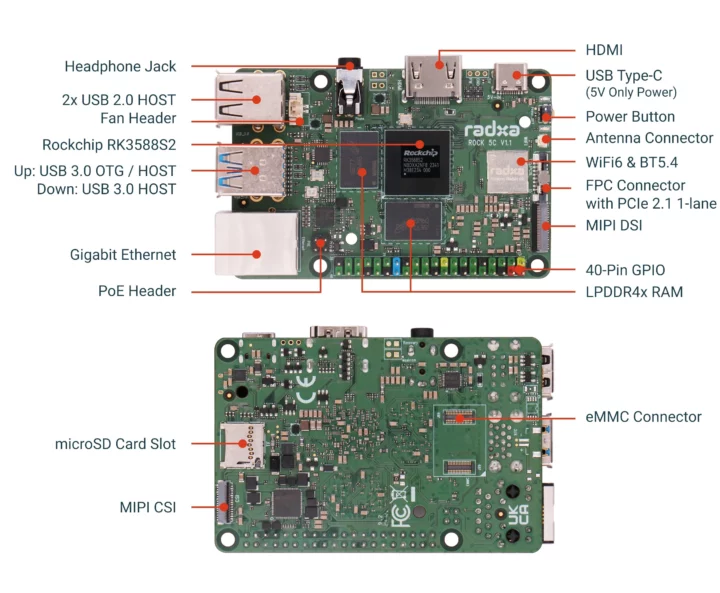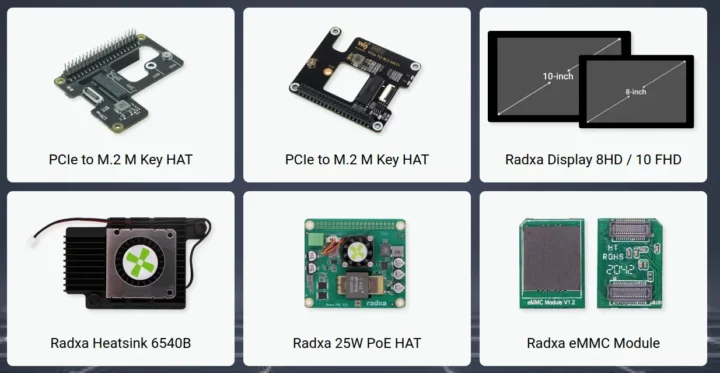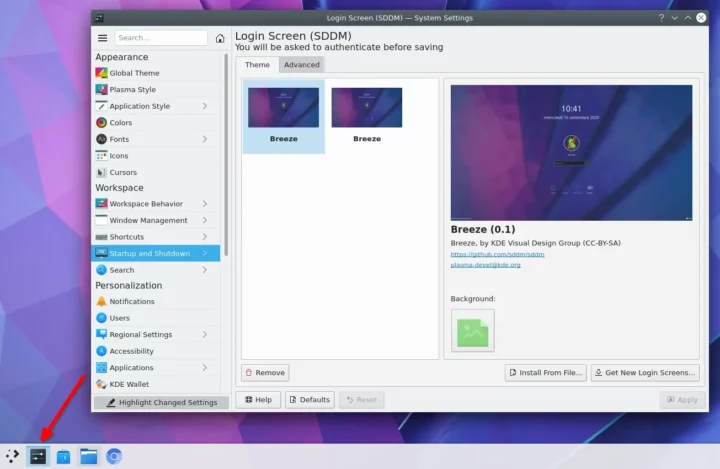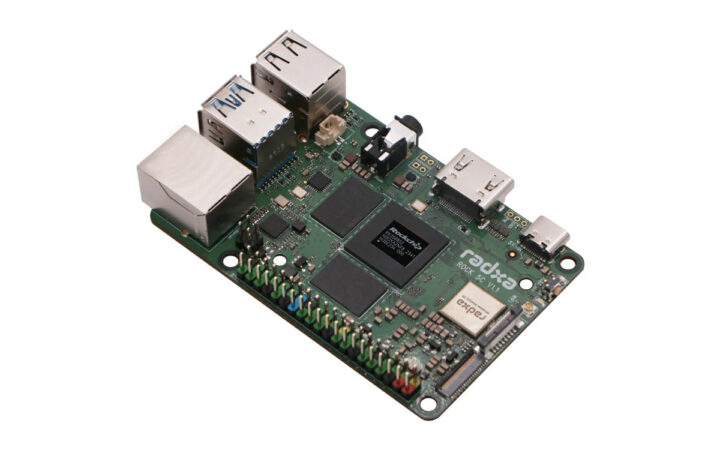First came the ROCK 5B pico-ITX SBC, then the Raspberry Pi 4-sized ROCK 5A board, and now Radxa has launched the Radxa ROCK 5C and 5C Lite single board computers powered by respectively Rockchip RK3588S2 octa-core and RK3582 hexa/octa-core “Lottery” processors.
The ROCK 5C (Lite) design is very similar to the ROCK 5A, but there are some notable differences. First, it replaces the two micro HDMI ports with a single HDMI port, then it removes the Key M socket for M.2 wireless modules to make place for a built-in WiFi 6 and Bluetooth 5.4 module plus a Raspberry Pi PCIe FFC connector, and finally, the ROCK 5C does not support an SPI flash module anymore.
The specifications of the ROCK 5C and ROCK 5 Lite SBC can be found in the table below.
| Model | ROCK 5C | ROCK 5C Lite |
|---|---|---|
| SoC | Rockchip RK3588S2 | Rockchip RK3582 |
| CPU | Quad-core Cortex-A76 with up to 2.4 GHz Quad-core Cortex-A55 at up to 1.8GHz | Dual-core Cortex-A76 with up to 2.4 GHz Quad-core Cortex-A55 at up to 1.8GHz |
| GPU | Arm Mali‑G610MC4 | N/A |
| NPU | 6 TOPS NPU | 5 TOPS NPU |
| RAM | 2GB, 4GB, 8GB, 16GB, or 32GB 64-bit LPDDR4x | 1GB, 2GB, 4GB, 8GB, or 16GB 64-bit LPDDR4x |
| Storage | eMMC module connector microSD Card No SPI flash |
|
| Video Output | HDMI 2.1 up to 8K MIPI DSI up to 2K |
|
| Multimedia | H.265 and VP9 decoder up to 8Kp60 H.264 decoder up to 8Kp30 AV1 decoder up to 4Kp60 H.264 and H.265 encoder up to 8Kp30 | H.264 and H.265 encoder up to 4Kp60 |
| Camera | 1x4 lane MIPI CSI |
|
| Ethernet | Gigabit Ethernet with optional PoE |
|
| Wireless | WiFi 6 and Bluetooth 5.4 with antenna connector |
|
| USB | 2x USB 2.0 ports 1x USB 3.0 host port 1x USB 3.0 OTG port |
|
| Expansion | Raspberry Pi FFC PCIe 2.1 x1 connector 40-pin Raspberry Pi GPIO header |
|
| Power Supply | 5V via USB-C port |
|
| Dimensions | 86 x 56 mm |
|

Both processors are new, so let’s have a look. First, how does RK3588S2 differ from RK3588S? They are basically the same except the RK3588S2 comes with an additional MIPI CSI interface which is not used in the ROCK 5C. The Rockchip RK3582 is also an RK3588S SoC but with some missing and cut-down features. Why do I call it a “lottery” processor? First, when chips are manufactured they have different capabilities on the wafer, and that’s why Intel has processors with the same die and features but different CPU and GPU frequencies. Some processors that mostly work but miss some features may be discarded impacting the yield. As I understand it that’s what Rockchip did with the RK3582, those are just RK3588S parts that would be previously discarded. That also explains why Radxa says that in some cases RK3582 may get four Cortex-A76 cores and/or a GPU. That’s the RK3582 lottery 🙂
Having said that, all advertised features of the RK3582 will work, and people will get at least a hexa-core Cortex-A76/A55 processor, no GPU, a 5 TOP NPU, and a 4K video encoder. We previously received the Rockchip RK3582 datasheet and the 4K video decoders are listed there. Maybe it was a preliminary datasheet, and those are not guaranteed to work anymore on the RK3582.

The presence of a 40-pin Raspberry Pi header and Raspberry Pi PCIe FFC connector means the ROCK 5C/5C Lite will also work with Raspberry Pi HAT+ including the ones made for the Raspberry Pi 5 such as the Waveshare PCIe to M.2 HAT or the official Raspberry Pi M.2 HAT+. It’s the second non-Pi single board computer with the 16-pin PCIe connector we’ve seen after the Kaki Pi, but the ROCK 5C will offer better compatibility since the connector is in the same position as the Pi 5. Radxa also made its own accessories with the heatsink 6540B active cooler, a PoE HAT, a few eMMC modules, and 8-inch and 10-inch displays.
Software-wise, Radxa provides the Debian-based Radxa OS and detailed documentation to get started, for low-level development, and for application development. You can also directly access the build script for Radxa OS on GitHub. Android is also being worked on but not available just yet, and I’m sure community-supported images will also be released.

Radxa ROCK 5C Lite sells for $51.53 on Aliexpress with 4GB RAM(Note: the 1GB model would go for $34.35, but it’s out of stock), and the Raxa ROCK 5C starts at $57.11 (2GB) or $68.56 (4GB) on the same page, meaning variants with RK3582 are about $17 cheaper than the ones based on RK3588S. Accessories such as the heatsink, displays, and eMMC modules can also be purchased from the relevant section on the company’s Aliexpress store. Additional information may be found on the product page.

Jean-Luc started CNX Software in 2010 as a part-time endeavor, before quitting his job as a software engineering manager, and starting to write daily news, and reviews full time later in 2011.
Support CNX Software! Donate via cryptocurrencies, become a Patron on Patreon, or purchase goods on Amazon or Aliexpress. We also use affiliate links in articles to earn commissions if you make a purchase after clicking on those links.





The great thing about this RK3582 is the missing GPU. The GPU on RK3588 cant run with just free software and require a huge closed source software blob. Current reports are that you can more often get all CPU cores working on the SoC but the GPU is really broken.
You still have a 8k HDMI output and so on with GPU disabled/broken.
Its a great product for people who would like to run the RK358* with most possible amount of free software.
(You can run a normal RK3588 with GPU disabled and have same result, but that would be waste of ASIC when you can also take the version with already broken GPU and use that one)
Does Rockchip now run without the ram blob?
What else with less then 10nm manufacturing could be chosen for a modern desktop replacement computer that run without a ram blob and with everything else free?
Still can’t access the Aliexpress products from France. I see the store and categories but they’re all empty. Dear Radxa, could you please keep some 1GB version available for those not fortunate enough to be able to purchase already 😉
Try arace.tech
Having a SBC without GPU is actually very good idea because you do not need to:
– wait several year for full support
– your destop experience will not broken with next distro upgrade
– you have zero expectations so you more likely will not be frustrated
– when you upgrade to new SoC also without GPU you cannot say why they are making same mistakes again and agin and my 2k screen is not supported when they declare 32k screen support
[ me being not aware of any Linux distro with ability for easily switching on|off the GPU acceleration for desktop graphical user interface, but also not inside demanding graphic intense programs. Seems A76 cores are very capable of replacing GPU functionality to some extent. ]
When Cinnamon desktop reports it is running in software mode then it is bad. Or Mozilla Firefox without GPU acceleration is sluggish on these Arm-based computers.
Yes, A76 cores are very capable but I am not sure if Lite version still has JPEG engine and full 2D engine.
Indeed. High quality video playback would often be sluggish, not to mention how hard the CPU would have to run to achieve half decent results. This means higher temps and also more power draw.
I get the argument that waiting ages for full GPU support is more than a pain, having at least some available is still very preferable for me.
Granted that if your applications don’t need GPU support there could be advantages from the lower cost but for the average home user I suspect that it’s absence would put most off because of the all round use that would be required, especially if what came before did have such functionality by default.
no gpu ?????
only applies to “ROCK 5C Lite”
no gpu and/or no two big cores.
If You are lucky they are there and You can use them.
Day 6 of clicking refresh for the Lite/1G to come into stock